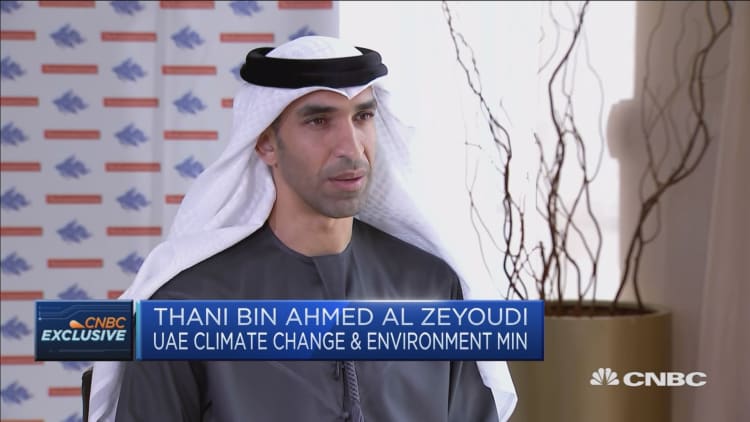
Abu Dhabi is hosting the sixth annual World Ocean Summit this week, drawing attention to the efforts the small Gulf emirate is making to combat climate change and the growing threat it poses to the region.
It's the first time the event, part of the Economist Group's World Ocean Initiative, is being hosted in the Middle East, a region known more for its fossil fuel industry than its environmental advocacy.
Thani Al Zeyoudi, the United Arab Emirates' minister of climate change and environment, wants to change that image. He's lauded the event as proof that his country, and the wider Gulf region, can play a leading role in combating threats to the world's seas.
"We're sending a message to the region and the world that the ocean has been and will continue always to be an integral part of our economy and our society," he told CNBC's Dan Murphy Tuesday, emphasizing the event's theme of "building bridges."
"Governments cannot do it alone, NGOs (non-governmental organization) cannot do it alone. We have to work together and we have to bring the private sector on board with us."
Rising sea levels threaten UAE population
Now a global maritime transport and trade hub, the UAE has come a long way from its humble beginnings as a small scattering of fishing villages in just the last 50 years. The blue economy, which encompasses fisheries, maritime transport, renewable energy and tourism, now comprises 68 percent of the UAE's gross domestic product, Al Zeyoudi said.
In addition to presenting myriad investment opportunities, the health of the ocean is of existential importance to the low-lying country of nearly 10 million. The UAE is classified as among the countries with the highest vulnerabilities to climate change in the world, along with numerous others along the Indian Ocean rim and small island nations in the Indian and Pacific Oceans.
"Any sea level rise is going affect a huge part of our coastal areas. Almost 80 percent of our population is living in coastal areas, so their communities are going to be destroyed," the minister said.
A 2010 report by the Stockholm Environment Institute found that the UAE "could lose up to 6 percent of its populated and developed coastline by the end of the century" due to rising sea levels, as reported on the UAE's official government portal. Ninety percent of the country's infrastructure sits along its coastal areas.
Al Zeyoudi also pointed to water scarcity and biodiversity degradation.
"Water scarcity here in the region and the droughts is affecting most of the sectors, especially agriculture, so that is why most of our food is imported from abroad," he said. The UAE imports an estimated 87 percent of its food, which presents massive issues for food security.
"Climate change is affecting our biodiversity, and with such harsh weather conditions and lack of water, this means that the biodiversity destruction is happening much faster than any other countries around the world."
The UAE is a signatory to the Paris Climate Accords, and in 2017 ratified its commitment to the UN Framework Convention on Climate Change, pledging to reduce fossil fuel-based power production and increasing renewable energy use to 27 percent of its total energy mix by 2021. Its state investment vehicle Mubadala, tasked with aiding the country's mission toward economic diversification, has already embarked on landmark renewable energy investments in recent years.
And the UAE won praise as home to the Middle East's most sustainable cities in a 2016 Sustainable Cities Index by consultancy firm Arcadis, with Dubai and Abu Dhabi coming in first and second place for the region, respectively, and Dubai coming in at 52nd place globally.



